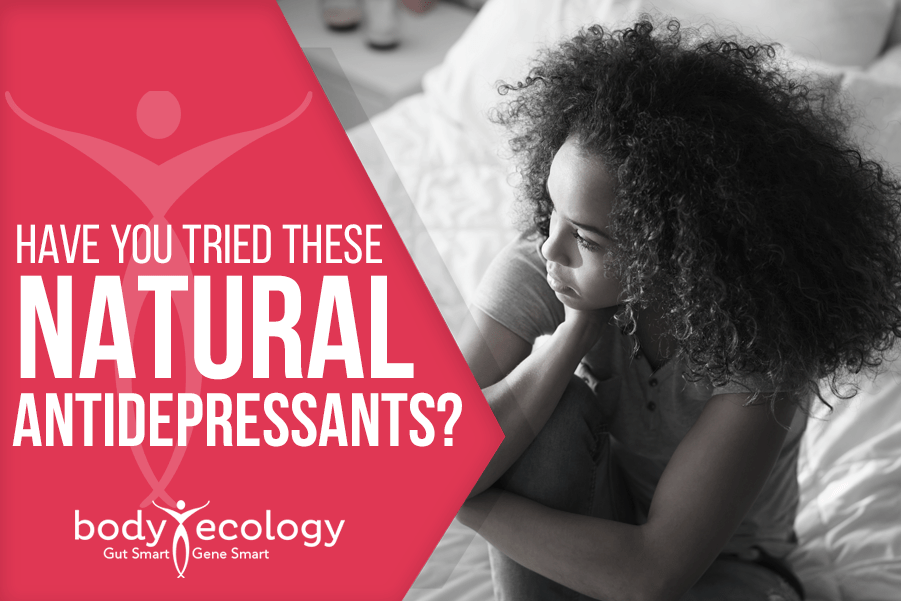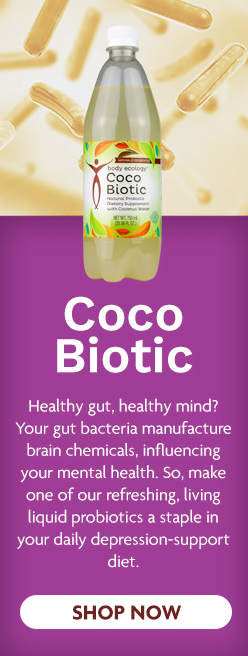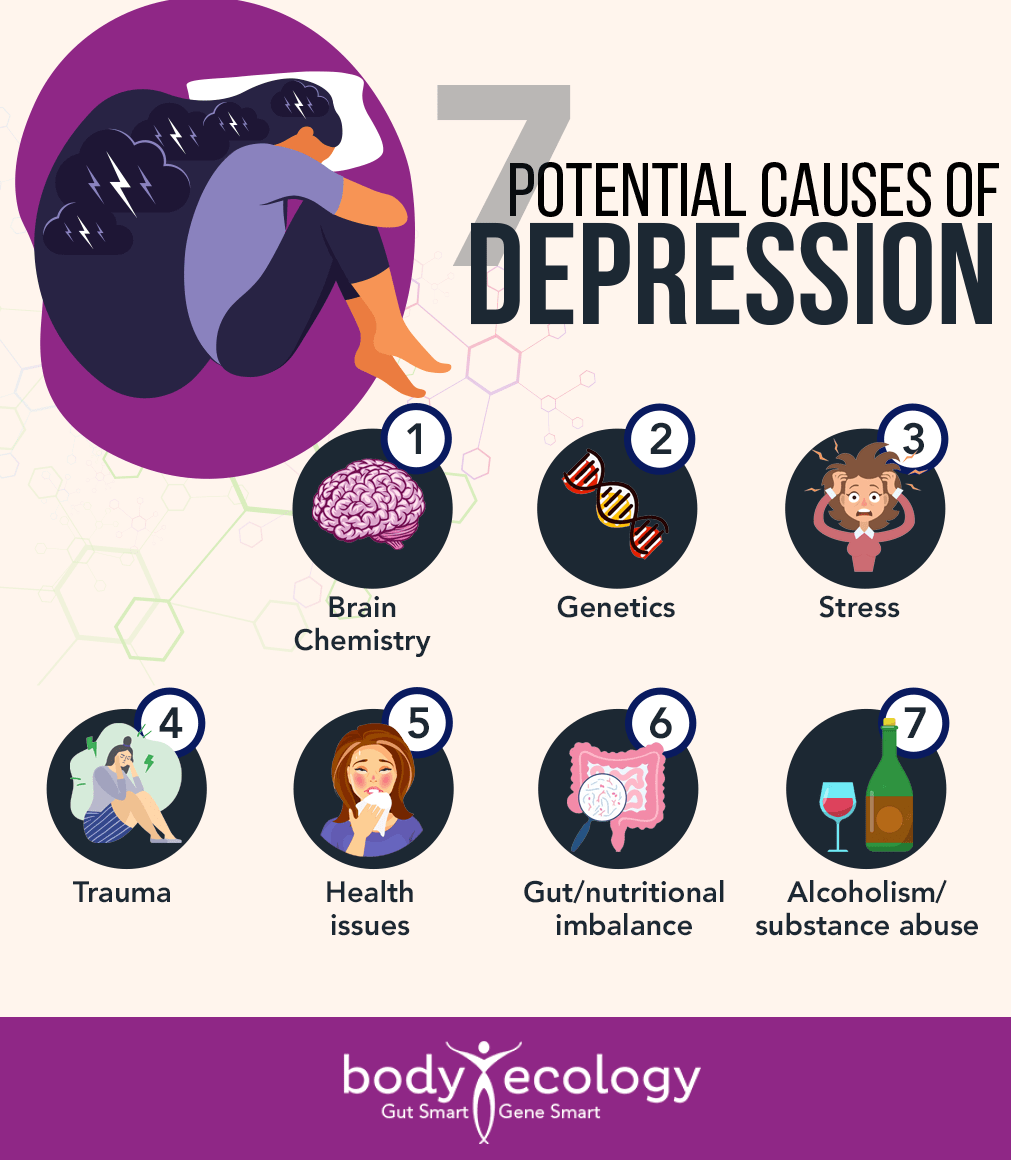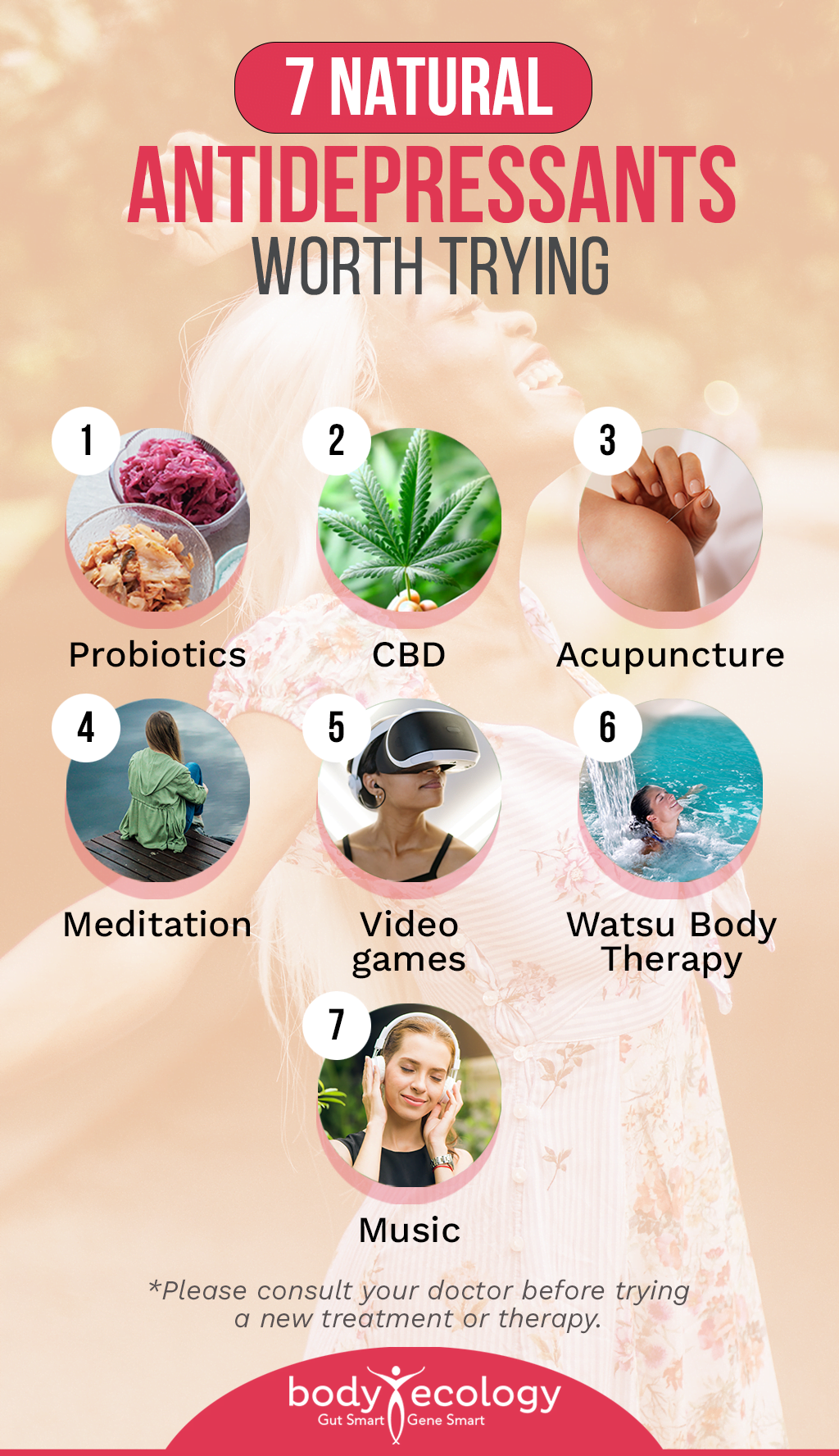
7 unexpected ways to manage depression without medication
Everyone gets sad from time to time, but for people who experience ongoing feelings of unhappiness, hopelessness, and low energy, depression might be the culprit. Depression is one of the most common mental health conditions in the United States, affecting about 5 percent of the adult population.1

Your healthcare professionals might diagnose you with depression if these or other common depressive symptoms (like unidentified physical pain, appetite changes, and more) are present for at least two weeks.
Left untreated, depression can lead to poor sleep and trouble concentrating, which can affect you personally and professionally. Fortunately, there are a number of treatment options to choose from when seeking help.
Understanding how depression is routinely treated in our Western world can better equip you to explore natural antidepressants and other non-medication options.
What to know about traditional Western treatments for depression
People with depression may either not make enough of certain neurotransmitters (chemical messengers), like serotonin or dopamine, or have trouble using the available neurotransmitters in their system. To address these issues, doctors practicing in the Western world frequently prescribe antidepressant medications.

These medications typically fall into three classes:2
- Tricyclic antidepressants (TCAs)
- Selective serotonin reuptake inhibitors (SSRIs)
- Selective serotonin noradrenaline reuptake inhibitors (SNRIs)
You might be familiar with these SSRIs:
- Citalopram (Celexa)
- Escitalopram (Lexapro)
- Paroxetine (Paxil)
- Fluoxetine (Prozac)
- Fluvoxamine (Luvox/Fevarin)
- Sertraline (Zoloft)
Of these SSRIs, fluvoxamine is receiving increased attention recently for its alleged effectiveness in treating COVID-19 because of its potential anti-inflammatory properties. Fluvoxamine is commonly used to treat symptoms of obsessive-compulsive disorder (OCD) and depression.
Early randomized control trials of its effectiveness in treating COVID-19 infections aren’t strong enough yet for the FDA to give its approval, according to the National Institutes of Health (NIH).
Still, some studies and anecdotal evidence suggest that short-term use of fluvoxamine for this purpose prevents most people infected with COVID-19 from becoming worse to the point of needing to be hospitalized.3
However, as with all medications, antidepressants come with their own risks.
There is a trial-and-error period where you and your healthcare provider work together to determine what medication you tolerate and in what dosage. Antidepressants can require up to eight to 12 weeks to take full effect. Further, they come with a host of side effects.
Antidepressants can cause weight fluctuations, lowered libido, headaches, and sleep problems, to name a few. In the long-term, prolonged use of antidepressants may lead to other health concerns, like heart attacks and strokes.4
There’s a reason The Body Ecology Program has helped so many people. Find out why.
What role does your body play in your mental health?
Before diving into natural antidepressants and alternative treatment options, it’s helpful to learn more about the ways in which your fuel choices and your body’s systems impact your mental balance and mood.
Your gut:
- How your gut processes foods and the makeup of your gut biome both influence how you feel mentally.
- Surprisingly, most of your body’s serotonin, one of the neurotransmitters responsible for your mood, is actually stored in your gut.5
- A healthy gut will lead to a healthier environment for neurotransmitters like serotonin. That’s why the link between gut health and mental health (AKA the gut-brain axis) is a growing field of research.
Your fuel:
- What you eat and drink on a daily basis can also affect your mood.
- A diet high in gluten sounds delicious (bread, anyone?), but it might actually lead to more inflammation in your body.
- This is concerning because research has shown a relationship between higher levels of inflammation and depression. In fact, when people with a gluten sensitivity ate gluten, they reported short-term feelings of depression.6
Knowing these connections, let’s look into a few alternatives to address depression without using prescription antidepressants.
7 natural antidepressants that science suggests may be effective

There are a number of ways to manage depression without medication. Here are some safe, natural antidepressants you may not have tried yet:
1. Consume a diet rich in probiotics.
We know the gut is essential to mental health and normal brain function, so how can you promote a healthy gut?7 Start by consuming more probiotics. These living microorganisms help your gut do things like digest food, create vitamins, and fight off infection and disease.8 You can find probiotics in fermented foods, drinks, and supplements.
2. Destress with CBD.
Cannabidiol (CBD) has been found to have antidepressant effects in early clinical trials, all without the risk of addiction.9
3. Improve energy flow through acupuncture.
Switching from Western to Eastern treatment techniques: Acupuncture is a popular practice where practitioners place small needles in your body to disperse blocked energy, with needle placement depending on your ailment. Research has shown these needles release endorphins, which can improve depressive symptoms.10
4. Meditate to relieve stress.
Mindfulness-based practices are growing in popularity to treat health conditions, like pain after surgery and opioid dependence.11 Interventions using mindfulness-based stress reduction have also shown positive improvements in depression scores.12
5. Start up your gaming console.
That’s right, video games are being explored as potential natural antidepressants. Though research is in the early stages, researchers like video games as a treatment alternative due to the fact that they’re low-cost, available globally, and not stigmatized.13 It probably matters what types of games you play, so consider non-violent options.
6. Try Watsu Body Therapy.
If your body’s receptors aren’t taking up available neurotransmitters, Watsu Body Therapy might be a beneficial approach to consider. Watsu uses flotation devices and partial submergence in water to create a weightless feeling. Clients report physical, mental, and emotional releases after these sessions.14
7. Turn on some music.
Music therapy is a surprisingly accessible option for people living with depression.15 Research shows music therapy works across demographics, reducing depression in adolescents as well as in elderly populations.16
Let’s recap: Depression is one of the most common mental health conditions in the world. While Western medicine tends to lean into prescribing antidepressants as the primary treatment, these drugs aren’t without risks.
Thankfully, there are several ways to manage depression that don’t require taking medication. Talk to your healthcare team about these natural antidepressants and other alternatives, including diet, body work, and technology.
REFERENCES:
- 1. “Depression key facts.” World Health Organization, 2021.
- 2. InformedHealth.org [Internet]. Cologne, Germany: Institute for Quality and Efficiency in Health Care (IQWiG); 2006-. Depression: How effective are antidepressants? [Updated 2020 Jun 18].
- 3. Reis G, Dos Santos Moreira-Silva EA, Silva DCM, Thabane L, Milagres AC, Ferreira TS, Dos Santos CVQ, de Souza Campos VH, Nogueira AMR, de Almeida APFG, Callegari ED, de Figueiredo Neto AD, Savassi LCM, Simplicio MIC, Ribeiro LB, Oliveira R, Harari O, Forrest JI, Ruton H, Sprague S, McKay P, Glushchenko AV, Rayner CR, Lenze EJ, Reiersen AM, Guyatt GH, Mills EJ; TOGETHER investigators. Effect of early treatment with fluvoxamine on risk of emergency care and hospitalisation among patients with COVID-19: the TOGETHER randomised, platform clinical trial. Lancet Glob Health. 2022 Jan;10(1):e42-e51. doi: 10.1016/S2214-109X(21)00448-4. Epub 2021 Oct 28. PMID: 34717820; PMCID: PMC8550952.
- 4. Maslej MM, Bolker BM, Russell MJ, Eaton K, Durisko Z, Hollon SD, Swanson GM, Thomson JA Jr, Mulsant BH, Andrews PW. The Mortality and Myocardial Effects of Antidepressants Are Moderated by Preexisting Cardiovascular Disease: A Meta-Analysis. Psychother Psychosom. 2017;86(5):268-282. doi: 10.1159/000477940. Epub 2017 Sep 14. PMID: 28903117.
- 5. Carpenter, S. (2012, September). That gut feeling. September 2012, Vol 43, No. 8. Print version: page 50.
- 6. Peters SL, Biesiekierski JR, Yelland GW, Muir JG, Gibson PR. (2014). Randomised clinical trial: gluten may cause depression in subjects with non-coeliac gluten sensitivity – an exploratory clinical study. ALIMENT PHARM THER, 39: 1104-1112.
- 7. Grégoire Chevalier, Eleni Siopi, Laure Guenin-Macé, Maud Pascal, Thomas Laval, Aline Rifflet, Ivo Gomperts Boneca, Caroline Demangel, Benoit Colsch, Alain Pruvost, Emeline Chu-Van, Aurélie Messager, François Leulier, Gabriel Lepousez, Gérard Eberl, Pierre-Marie Lledo. Effect of gut microbiota on depressive-like behaviors in mice is mediated by the endocannabinoid system. Nature Communications, 2020; 11 (1) DOI: 10.1038/s41467-020-19931-2.
- 8. Pipat Piewngam, Yue Zheng, Thuan H. Nguyen, Seth W. Dickey, Hwang-Soo Joo, Amer E. Villaruz, Kyle A. Glose, Emilie L. Fisher, Rachelle L. Hunt, Barry Li, Janice Chiou, Sujiraphong Pharkjaksu, Sunisa Khongthong, Gordon Y. C. Cheung, Pattarachai Kiratisin, Michael Otto. Pathogen elimination by probiotic Bacillus via signalling interference. Nature, 2018; DOI: 10.1038/s41586-018-0616-y.
- 9. Garcia-Gutierrez MS, et al. (2020). Cannabidiol: A potential new alternative for the treatment of anxiety, depression, and psychotic disorders. Biomolecules, 10.
- 10. Han JS. Acupuncture and endorphins. Neurosci Lett. 2004 May 6;361(1-3):258-61. doi: 10.1016/j.neulet.2003.12.019. PMID: 15135942.
- 11. Niazi AK, Niazi SK. (2011). Mindfulness-based stress reduction: a non-pharmacological approach for chronic illnesses. N Am J Med Sci, 2: 20-23.
- 12. Norouzi E. et al. (2020). Implementation of a mindfulness-based stress reduction (MBSR) program to reduce stress, anxiety, and depression and to improve psychological well-being among retired Iranian football players. Psychol Sport Exerc, 47.
- 13. Kowal M. et al. (2021). Gaming your mental health: A narrative review on mitigating symptoms of depression and anxiety using commercial video games. JMIR Serious Games, 9.
- 14. Schitter AM, Fleckenstein J. Passive Hydrotherapy WATSU® for Rehabilitation of an Accident Survivor: A Prospective Case Report. Complement Med Res. 2018;25(4):263-268. doi: 10.1159/000487768. Epub 2018 May 15.
- 15. Leubner D, Hinterberger T. (2017). Reviewing the effectiveness of music interventions in treating depression. FRONT PSYCHOL, 8:1-21.
- 16. Aalbers S, Fusar-Poli L, Freeman RE, Spreen M, Ket JCF, Vink AC, et al. Music therapy for depression. Cochrane Database Syst Rev [Internet]. 2017 [cited 2018 Feb 28];(11). Art. No.: CD004517. doi: 10.1002/14651858.CD004517.pub3.








